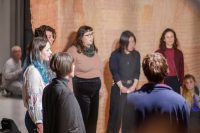USTA Album Release & Concert spalarnia by Wojciech Kosma 29 May 2022 Galerie Molitor, Berlin
Past
Ketuta Alexi-Meskhishvili 'Talk to me' and a toast with Ketuta Alexi-Meskhishvili and Elena Filipovic as part of Finally Saturday 17 June 2023, 7-7:30 pm Kunsthalle Basel, Basel
Summer Concert Two solo performances by FRANKIE and M.K. Frøslev in the context of Edita Schubert's Self Portrait Behind a Perforated Canvas. 27 July 2023, 7-9 pm Galerie Molitor, Berlin
One-Meter Rule — Filmscreenings and Discussions Program organized by Dora Budor 1-2 September 2023, 8 pm Klosterruine, Berlin
Summer Concert Screening of Penny Goring's Necrosong (2024) Performance by Theresa Patzschke 18 July 2024 Galerie Molitor, Berlin
Dora Budor in conversation with Martin Germann in the context of the exhibition Dora Budor & Marcel Proust, Brissaud method 7 November 2024
Dora Budor Eastern Neighbours Film Festival: Between Film and Art 30 November 2024 Filmhuis, Den Haag

